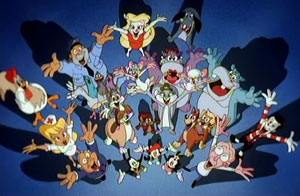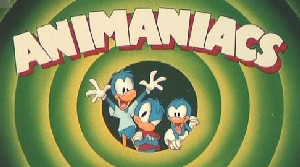Animaniacs facts for kids
Quick facts for kids Animaniacs |
|
|---|---|
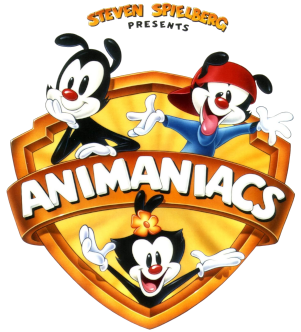
Series logo featuring (from left to right) Yakko Warner, Dot Warner, and Wakko Warner
|
|
| Genre |
|
| Created by | Tom Ruegger |
| Voices of |
|
| Theme music composer | Richard Stone |
| Opening theme | "Animaniacs Theme" performed by Rob Paulsen, Tress MacNeille, and Jess Harnell |
| Ending theme | "Animaniacs End Title" |
| Composer(s) |
|
| Country of origin | United States |
| Original language(s) | English |
| No. of seasons | 5 |
| No. of episodes | 99 (274 segments) (list of episodes) |
| Production | |
| Executive producer(s) | Steven Spielberg |
| Producer(s) |
|
| Running time | 20–21 minutes (1–10 minutes per segment) |
| Production company(s) |
|
| Release | |
| Original network | Fox |
| Original release | September 13, 1993 – November 12, 1994 |
| Chronology | |
| Related shows | |
Animaniacs is an American animated comedy musical television series created by Tom Ruegger for Fox's Fox Kids block in 1993, before moving to The WB in 1995, as part of its Kids' WB afternoon programming block, until the series ended on November 14, 1998. It is the second animated series produced by Steven Spielberg's Amblin Entertainment in association with Warner Bros. Animation, after Tiny Toon Adventures. It initially ran a total of 99 episodes, along with a feature-length film, Wakko's Wish. Reruns later aired on Cartoon Network from 1997 to 2001, Nickelodeon from 2001 to 2003, Nicktoons from 2003 to 2005, and Discovery Family (known as The Hub Network at the time) from 2012 (when Wakko's Wish premiered) to 2014.
Animaniacs is a variety show, with short skits featuring a large cast of characters. While the show had no set format, the majority of episodes were composed of three short mini-episodes, each starring a different set of characters, and bridging segments. Hallmarks of the series included its music, satirical social commentary, pop culture references, character catchphrases, and innuendo directed at an adult audience.
A revival of the series was announced in January 2018, with a two-season order, to be produced in conjunction with Amblin Entertainment and Warner Bros. Animation, with producer Steven Spielberg, songwriter Randy Rogel, and many of the main voice actors returning. It premiered on November 20, 2020, on Hulu, with a second season premiering on November 5, 2021, and a third and final season premiering on February 17, 2023.
Contents
Background
Premise
The Warner siblings live in the Warner Bros. Water Tower on the Warner Bros. studio lot in Burbank, California. However, characters from the series had episodes in various places and periods of time. In their zany hijinks, the Animaniacs characters interacted with famous people and creators of the past and present, as well as mythological characters and characters from contemporary pop culture and television. Andrea Romano, the casting and recording director of Animaniacs, said that the Warner siblings functioned to "tie the show together," by appearing in and introducing other characters' segments.
Each Animaniacs episode usually consisted of two or three cartoon shorts. Animaniacs segments ranged in time, from bridging segments less than a minute long to episodes spanning the entire show's length; writer Peter Hastings said that the varying episode lengths gave the show a "sketch comedy" atmosphere.
Characters
Animaniacs had a large cast of characters, separated into individual segments, with each pair or set of characters acting in its own plot. The Warner siblings, Yakko, Wakko, and Dot, are three 1930s cartoon stars of an unknown species (one Tom Ruegger named "Cartoonus characterus") that were locked away in the WB Tower until the 1990s, when they escaped. After their escape, they often interacted with other Warner Bros. studio workers, including Ralph the Security Guard; Dr. Otto Scratchansniff, the studio psychiatrist; and his assistant, Hello Nurse. Pinky and the Brain are two genetically altered anthropomorphic laboratory mice who continuously plot and attempt to take over the world. Slappy Squirrel is an octogenarian anthropomorphic cartoon star who can easily outwit antagonists and uses her wiles to educate her nephew, Skippy Squirrel, about cartoon techniques. Additional principal characters included three anthropomorphic Italian-American pigeons known as The Goodfeathers, Buttons and Mindy, Chicken Boo, Flavio and Marita (The Hip Hippos) and Katie Ka-Boom. Exclusive to the first season, Rita and Runt, two strays that get into massive trouble and adventures, and Minerva Mink, a young attractive anthropomorphic mink, starred in their own segments. The Pinky and the Brain segment was the only segment, aside from the Warners themselves, to get in the reboot, excluding the episode "Good Warner Hunting", in which all the original characters appeared at the end of the episode, excluding Pinky and the Brain.
Cast
Animaniacs featured Rob Paulsen as Yakko, Pinky, and Dr. Otto von Scratchansniff, Tress MacNeille as Dot, Jess Harnell as Wakko, show writer Sherri Stoner as Slappy Squirrel, Maurice LaMarche as the Brain, Squit and the belching segments "The Great Wakkorotti" (Harnell said that he himself is commonly mistaken for the role), and veteran voice actor Frank Welker as Ralph the Security Guard, Thaddeus Plotz and Runt. Andrea Romano said that the casters wanted Paulsen to play the role of Yakko: "We had worked with Rob Paulsen before on a couple of other series and we wanted him to play Yakko." Romano said that the casters had "no trouble" choosing the role of Dot, referring to MacNeille as "just hilarious ...And yet [she had] that edge." MacNeille had already been part of Tiny Toons Adventures as Babs Bunny, a role "custom made" for her, and Spielberg encouraged her to audition for the role of Dot in Animaniacs. Before Animaniacs, Harnell had little experience in voice acting other than minor roles for Disney which he "fell into". Harnell revealed that at the audition for the show, he did a John Lennon impression and the audition "went great".
For Pinky and the Brain, LaMarche had been a long-time aficionado of Orson Welles, including the infamous Frozen Peas outtake, and when he auditioned for various characters in the show, immediately saw the Brain as having a Welles-like character, adapting his voice for the role. Paulsen took inspiration from British comedy such as Monty Python's Flying Circus for Pinky's voice.
Stoner commented that when she gave an impression of what the voice would be to Spielberg, he said she should play Slappy herself. According to Romano, she personally chose Bernadette Peters to play Rita. Other voices were provided by Jim Cummings, Paul Rugg, Vernee Watson-Johnson, Jeff Bennett and Gail Matthius. Tom Ruegger's three sons also played roles in the series. Nathan Ruegger voiced Skippy Squirrel, the nephew of Slappy, throughout the duration of the series; Luke Ruegger voiced The Flame in historical segments on Animaniacs; and Cody Ruegger voiced Birdie from Wild Blue Yonder.
Animation
Animation work on Animaniacs was farmed out to several different studios, both American and international, over the course of the show's production. The animation companies included Tokyo Movie Shinsha of Japan, StarToons of Chicago, Wang Film Productions of Taiwan, Shanghai Morning Sun Animation and Sichuan Top Animation of China, Freelance Animators New Zealand of New Zealand, Seoul Movie (a subsidiary of TMS) and AKOM of South Korea, and most Animaniacs episodes frequently had animation from different companies in each episode's respective segments.
Animaniacs was made with a higher production value than standard television animation; the series had a higher cel count than most TV cartoons. The Animaniacs characters often move fluidly, and do not regularly stand still and speak, as in other television cartoons.
Music
Animaniacs utilized a heavy musical score for an animated program, with every episode featuring at least one original score. The idea for an original musical score in every episode came from Steven Spielberg. Animaniacs used a 35-piece orchestra, and seven composers were contracted to write original underscore for the series' run: Richard Stone, Steve Bernstein, Julie Bernstein, Carl Johnson, J. Eric Schmidt, Gordon Goodwin, and Tim Kelly. The use of the large orchestra in modern Warner Bros. animation began with Animaniacs predecessor, Tiny Toon Adventures, but Spielberg pushed for its use even more in Animaniacs. Although the outcome was a very expensive show to produce, "the sound sets us apart from everyone else in animation," said Jean MacCurdy, the executive in charge of production for the series. According to Steve and Julie Bernstein, not only was the Animaniacs music written in the same style as that of Looney Tunes composer Carl Stalling, it was recorded at the Eastwood Scoring Stage, which was used by Stalling as well as its piano. Senior producer Tom Ruegger said that writers Randy Rogel, Nicholas Hollander, and Deanna Oliver wrote "a lot of music" for the series.
Hallmarks and humor
The humor of Animaniacs varies in type, ranging from parody to cartoon violence. The series made parodies of television shows and films. In an interview, Spielberg defended the "irreverence" of Animaniacs, saying that the Animaniacs crew has "a point of view" and does not "sit back passively and play both sides equally". Spielberg also said that Animaniacs' humor of social commentary and irreverence were inspired by the Marx Brothers and Looney Tunes cartoons. Animaniacs, among other Spielberg-produced series, had a large amount of cartoon violence. Spielberg defended the violence in Animaniacs by saying that the series had a balance of both violent humor and educational segments, so the series would never become either too violent or "benign". Animaniacs also made use of catchphrases, recurring jokes and segments, and "adult" humor.
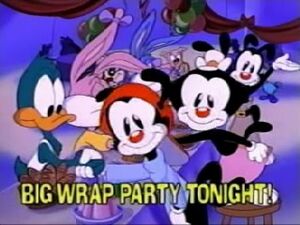
Recurring jokes and catchphrases
Characters on Animaniacs had catchphrases, with some characters having more than one. Notable catchphrases include Yakko's "Goodnight, everybody!" often said following adult humor, Wakko's "Faboo!" and Dot's frequent assertions of her cuteness. The most prominent catchphrase that was said by all three Warners was "Hello-o-o, nurse!" Tom Ruegger said that the "Hello-o-o, nurse!" line was intended to be a catchphrase much like Bugs Bunny's line, "Eh, what's up, Doc?" Before the theme song for each "Pinky and the Brain" segment, Pinky asks, "Gee, Brain, what do you want to do tonight?", to which Brain replies, "The same thing we do every night, Pinky: try to take over the world!" During these episodes, Brain often asks Pinky, "Pinky, are you pondering what I'm pondering?" whenever inspiration for a part of his plan has struck him and Pinky replies with a silly non sequitur that changes with every episode. Writer Peter Hastings said that he unintentionally created these catchphrases when he wrote the episode "Win Big", and then producer Sherri Stoner used them and had them put into later episodes.
Running gags and recurring segments were very common in the series. The closing credits for each episode always included one joke credit and ended with a water tower gag similar to The Simpsons couch gag. Director Rusty Mills and senior producer Tom Ruegger said that recurring segments like the water tower gag and another segment titled "The Wheel of Morality" (which, in Yakko's words, "adds boring educational value to what would otherwise be an almost entirely entertaining program", and ends with a "moral" that makes absolutely no sense) eased the production of episodes because the same animated scenes could be used more than once (and, in the case of the Wheel segments, enabled the producers to add a segment in where there was not room for anything else in the episode).
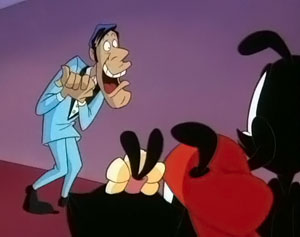
Parodies
Animaniacs parodied popular TV shows and movies and caricatured celebrities. Animaniacs made fun of celebrities, major motion pictures, television series for adults (Seinfeld, Beverly Hills 90210 and Friends, among others), television series for children (such as Barney & Friends and Rugrats), and trends in the U.S. One episode even made fun of competing show Power Rangers, and another episode caricatured Animaniacs' own Internet fans. Animaniacs also made potshots of Disney films, creating parodies of such films as The Lion King, Beauty and the Beast, Pocahontas, Bambi, and others. Animaniacs director Russell Calabrese said that not only did it become a compliment to be parodied on Animaniacs, being parodied on the series would be taken as a "badge of honor".
Songs
Animaniacs had a variety of music types. Many Animaniacs songs were parodies of classical or folk music with educational lyrics. These include Yakko's World and the Nations of the World updated in which Yakko sings the names of all 200-some nations of the world at the time to the tune of the "Mexican Hat Dance". "Wakko's America" listed all the United States and their capitals to the tune of "Turkey in the Straw". Another song, titled "The Presidents", named every U.S. president at the time to the tune of the "William Tell Overture" (with brief snippets of the tunes "Mademoiselle from Armentieres" and "Dixie"). Non-educational song parodies were also used, such as "Slippin' on the Ice," a parody of "Singin' in the Rain". Most of the groups of characters had their own theme songs for their segments on the show.
The Animaniacs theme song, performed by the Warners, won an Emmy Award for best song. Ruegger wrote the lyrics, and Stone composed the music for the title sequence. Several Animaniacs albums and sing-along VHS tapes were released, including the CDs Animaniacs, Yakko's World, and Animaniacs Variety Pack, and the tapes Animaniacs Sing-Along: Yakko's World and Animaniacs Sing-Along: Mostly in Toon.
History
Animaniacs is an american animated series that aired on 1993 until 1998.
Overview
| Season | Episodes | First episode | Last episode |
|---|---|---|---|
| 1 | 65 | September 13, 1993 | May 24, 1998 |
| 2 | 4 | September 9, 1994 | Novembr 10, 1994 |
| 3 | 13 | September 9, 1995 | February 24, 1996 |
| 4 | 8 | September 7, 1996 | November 16, 1996 |
| 5 | 9 | September 8, 1997 | November 14, 1998 |
Episodes
Season 1 (1993-1994)
| Prod. No. | Title | Written by | Original airdate |
|---|---|---|---|
| 1 | "De-Zanitized" | Paul Rugg | September 13, 1993 |
| "The Monkey Song" | Tom Ruegger | ||
| "Nighty-Night Toon" | Nicholas Hollander | ||
| 2 | "Yakko's World" | Randy Rogel | September 14, 1993 |
| "Cookies For Einstein" | Paul Rugg | ||
| "Win Big" | Tom Reugger, Peter Hastings | ||
| 3 | "HMS Yakko" | Paul Rugg | September 15, 1993 |
| "Slappy Goes Walnuts" | Sherri Stonner | ||
| Yakko's Universe | Randy Rogel | ||
| 4 | "Hooked in a Ceiling" | Tom Reugger, Gordon Bressack, Charles M. Howell IV | September 16, 1993 |
| "Goodfeathers: The Beggining" | Deanna Oliver | ||
| 5 | "Taming of the Screwy" | Peter Hastings, Earl Kress, Tom Reugger | September 17, 1993 |
| 6 | "Temporary Insanity" | Paul Rugg | September 20, 1993 |
| "Operation: Lollipop" | Peter Hastings | ||
| "What Are We?" | Randy Rogel | ||
| 7 | "Piano Rag" | Ncholas Holland | September 21, 1993 |
| "When Rita Met Runt" | Sherri Stoner | ||
| 8 | "The Big Candy Store" | Sherri Stoner, Paul Rugg | September 22, 1993 |
| "Bumbie's Mom" | Sherri Stoner | ||
| 9 | "Wally Llama" | Paul Rugg | September 23, 1993 |
| "Where Rodents Dare" | Peter Hastings, Tom Reugger | ||
| 10 | "King Yakko" | Peter Hastings | September 24, 1993 |
| 11 | "No Pain, No Painting" | Peter Hastings | September 27, 1993 |
| "Les Miseranimals" | Deanna Oliver |
See also
 In Spanish: Anexo:Episodios de Animaniacs para niños
In Spanish: Anexo:Episodios de Animaniacs para niños
Fox Kids era: Episodes 1–69
Animaniacs premiered on September 13, 1993, on the Fox Kids programming block of the Fox network, and ran there until September 8, 1995; new episodes aired from the 1993 through 1994 seasons. Animaniacs aired with a 65-episode first season because these episodes were ordered by Fox all at once. While on Fox Kids, Animaniacs gained fame for its name and became the second-most popular show among children ages 2–11 and children ages 6–11, second only to Mighty Morphin Power Rangers (which began that same year). On March 30, 1994, Yakko, Wakko, and Dot first theatrically appeared in the animated short, "I'm Mad", which opened nationwide alongside the full-length animated feature, Thumbelina. The musical short featured Yakko, Wakko, and Dot bickering during a car trip. Producers Steven Spielberg, Tom Ruegger, and Jean MacCurdy wanted "I'm Mad" to be the first of a series of shorts to bring Animaniacs to a wider audience. However, "I'm Mad" was the only Animaniacs theatrical short produced. The short was later incorporated into Animaniacs episode 69. Following the 65th episode of the series, Animaniacs continued to air in reruns on Fox Kids. The only new episodes during this time included a short, four-episode second season that was quickly put together from unused scripts. After Fox Kids aired Animaniacs reruns for a year, the series switched to the new Warner Bros. children's programming block, Kids' WB.
Kids' WB era: Episodes 70–99
The series was popular enough for Warner Bros. Animation to invest in additional episodes of Animaniacs past the traditional 65-episode marker for syndication. Animaniacs premiered on the new Kids' WB line-up on September 9, 1995, with a new season of 13 episodes. At this time, the show's popular cartoon characters, Pinky and the Brain, were spun off from Animaniacs into their own half-hour TV series. Warner Bros. stated in a press release that Animaniacs gathered over 1 million children viewers every week.
Despite the series' success on Fox Kids, Animaniacs on Kids' WB was successful only in an unintended way, bringing in adult viewers and viewers outside the Kids' WB target demographic of young children. This unintended result of adult viewers and not enough young viewers put pressure on the WB network from advertisers and caused dissatisfaction from the WB network towards Animaniacs. Slowly, orders from the WB for more Animaniacs episodes dwindled and Animaniacs had a couple more short seasons, relying on leftover scripts and storyboards. The fourth season had eight episodes, which was reduced from 18 because of Warner Bros.' dissatisfaction with the series. The 99th and final Animaniacs episode aired on November 14, 1998.
The Chicago Tribune reported in 1999 that the production of new Animaniacs episodes ceased and the direct-to-video feature film Animaniacs: Wakko's Wish was a closer to the series. Animation World Network reported that Warner Bros. laid off over 100 artists, contributing to the reduced production of the original series. Producer Tom Ruegger explained that rather than produce new episodes, Warner Bros. instead decided to use the back-catalog of Animaniacs episodes until "someone clamors for more." Animaniacs segments were shown along with segments from other cartoons as part of The Cat&Birdy Warneroonie PinkyBrainy Big Cartoonie Show. Ruegger said at the time the hiatus was "temporary". Following the end of the series, the Animaniacs team developed Animaniacs: Wakko's Wish, which was released on December 21, 1999. In 2016, Ruegger said on his Reddit AMA that the decline of Animaniacs and other series was the result of Warner Bros.' investment in the much cheaper anime series Pokémon. After Warner Bros. gained distribution rights to the cheaper and successful anime, the network chose to invest less in original programming like Animaniacs.
After Animaniacs
After Animaniacs, Spielberg collaborated with Warner Bros. Animation again to produce the short-lived series Steven Spielberg Presents Freakazoid, along with the Animaniacs spin-off series Pinky and the Brain, from which Pinky, Elmyra & the Brain was later spun off. Warner Bros. also produced two other comedy animated series in the later half of the decade titled Histeria! and Detention, which were short-lived and unsuccessful compared to the earlier series. Later, Warner Bros. cut back the size of its animation studio because the show Histeria! went over its budget, and most production on further Warner Bros. animated comedy series ended.
Since 2016, Paulsen, Harnell, and MacNeille have toured as Animaniacs Live!, performing songs from Animaniacs! along with a full orchestra. Among the songs will be an updated version of "Yakko's World" by Randy Rogel that includes a new verse to include nations that have been formed since the song's original airing, such as those from the break-up of the Soviet Union.
Wakko's Wish
The Warners starred in the feature-length direct-to-video movie Animaniacs: Wakko's Wish. The movie takes place in the fictional town of Acme Falls, in which the Warners and the rest of the Animaniacs cast are under the rule of a greedy king who conquered their home country from a neighboring country. When the Warners find out about a star that will grant a wish to the first person that touches it, the Warners, the villagers (the Animaniacs cast), and the king race to get to it first. Although children and adults rated Animaniacs: Wakko's Wish highly in test-screenings, Warner Bros. decided to release it direct-to-video, rather than spend money on advertising. Warner Bros. released the movie on VHS on December 21, 1999; the film was then released on DVD much later on October 7, 2014.
Merchandise
Home media
Episodes of the show have been released on DVD and VHS during and after the series' run.
VHS tapes of Animaniacs were released in the United States and in the United Kingdom. All of these tapes are out of print, but are still available at online sellers. The episodes featured are jumbled at random and are in no particular order with the series. Each video featured four to five episodes each which were accompanied by a handful of shorter skits, with a running time of about 45 minutes.
Beginning on July 25, 2006, Warner Home Video began releasing DVD volume sets of Animaniacs episodes in order of the episodes' original airdates. Volume one of Animaniacs sold very well; over half of the product being sold in the first week made it one of the fastest selling animation DVD sets that Warner Home Video ever put out.
| DVD name | Ep. # | Release date | Additional information |
|---|---|---|---|
| Animaniacs Volume 1 | 25 | July 25, 2006 | This five-disc box set contains the first 25 episodes from season 1. Includes the featurette "Animaniacs Live!", where Maurice LaMarche hosts an interview via satellite TV with Animaniacs voice actors, writers, and composers as they comment on the show. |
| Animaniacs Volume 2 | 25 | December 5, 2006 | This five-disc box set contains the second 25 episodes (26–50) from season 1. Includes the featurette "The Writers Flipped, They Have No Script", where Maurice LaMarche leads a gathering of writers on what their favorite Animaniacs episodes are. |
| Animaniacs Volume 3 | 25 | June 19, 2007 | This five-disc box set includes the last 15 episodes (51–65) of season 1, all four episodes of season 2, and the first six episodes of season 3. Includes two featurettes: "They Can't Help It If They're Cute, They're Just Drawn That Way", a production commentary from the character designers, storyboard artists and art directors of the series; and "They're Totally Insane-y: In Cadence with Richard Stone", a discussion on the music of Animaniacs and a tribute to composer Richard Stone. |
| Animaniacs Volume 4 | 24 | February 5, 2013 | This three-disc box set contains the final seven episodes of season 3 (76–82) and all of the episodes of both seasons 4 (83–90) and 5 (91–99). There are no special features included in this volume. |
| The Complete Series | 99 + 1 film | October 2, 2018 | This 19-disc box set includes all 99 episodes of the series from all five seasons, as well as the direct-to-video film Animaniacs: Wakko's Wish. The special features from the previous first three volumes are also included in this set. |
An Animaniacs comic book, published by DC Comics, ran from 1995 to 2000 (59 regular monthly issues, plus two Specials). Initially, these featured all the characters except for Pinky and the Brain, who were published in their own comic book series (which ran for a Christmas Special issue and then 27 regular issues from July 1996 to November 1998 before its cancellation), though cameos were possible. The Animaniacs comic book series was later renamed Animaniacs! featuring Pinky and the Brain with issue #43 and ran for another 16 issues before its cancellation. The Animaniacs comic book series, like the TV series, parodied TV, film and comic book standards such as Pulp Fiction and The X-Files, among others.
Video games
Animaniacs was soon brought into the video game industry to produce games based on the series. The list includes titles such as:
- Animaniacs (1994, Genesis, SNES, Game Boy)
- Animaniacs Game Pack! (1997, PC, North America only)
- Pinky and the Brain: World Conquest (1998, PC)
- Animaniacs: Ten Pin Alley (1998, PS1, North America only)
- Animaniacs: A Gigantic Adventure (1999, PC)
- Animaniacs: Splat Ball! (1999, PC)
- Pinky and the Brain: The Master Plan (2002, GBA, Europe only)
- Animaniacs: The Great Edgar Hunt (2005, GC, PS2, Xbox)
- Animaniacs: Lights, Camera, Action! (2005, GBA, DS).
Musical collections
Because Animaniacs had many songs, record labels Rhino Entertainment and Time Warner Kids produced albums featuring songs from the series. These albums include:
- Animaniacs (1993)
- Yakko's World (1994)
- Animaniacs Variety Pack (1995)
Additionally, a book on tape album, A Christmas Plotz, was produced during the show's run and subsequently re-issued on CD as A Hip-Hopera Christmas. After the series' run, two additional discount albums compiling tracks from previous releases were released under Rhino's Flashback label, The Animaniacs Go Hollywood and The Animaniacs Wacky Universe, and the compilation album The Animaniacs Faboo! Collection (1995).
2020 revival series
A revival series of Animaniacs was ordered by Hulu in May 2017 for an initial two-season order, following the popularity of the original series after Netflix had added it to their library in 2016. The first season of 13 episodes was released on November 20, 2020, while the second season was released on November 5, 2021 and the third and final season was released on February 17, 2023. Wellesley Wild served as the showrunner and as executive producer along with Gabe Swarr. According to Wild, Steven Spielberg was heavily involved with bringing the series back and insisting on many of the original voice cast and elements be used for the revival. This includes the return of Yakko, Wakko, and Dot (voiced by Paulsen, Harnell, and MacNeille) and Pinky and the Brain (voiced by Paulsen and LaMarche), and the use of a small orchestra for the musical works composed by Julie and Steven Bernstein, who both composed additional music during the series' original run, as well as other composers trained by Richard Stone and Randy Rogel.
See also
 In Spanish: Animaniacs para niños
In Spanish: Animaniacs para niños


